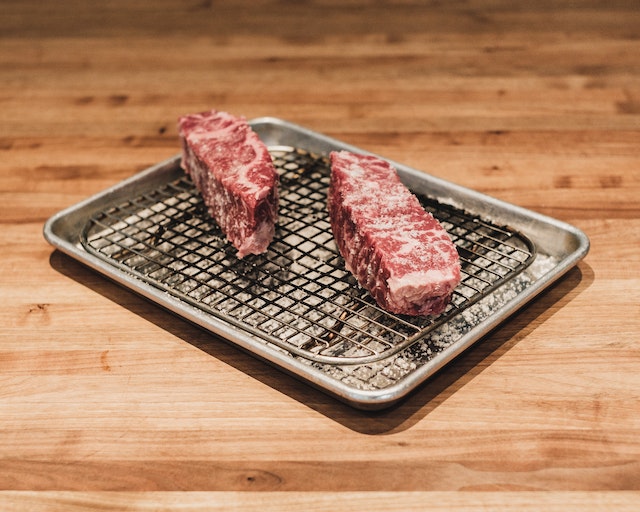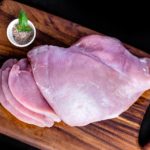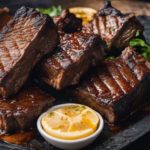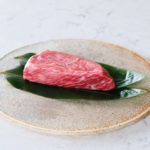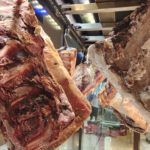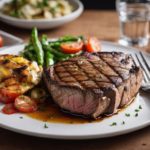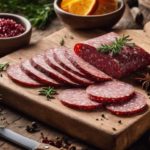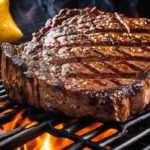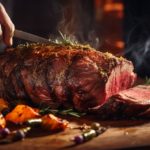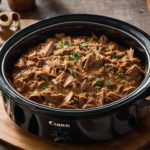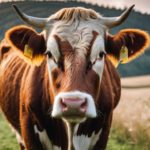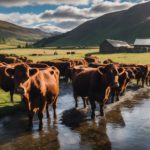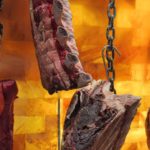Ever found yourself salivating over the thought of biting into a lusciously marbled steak bursting with flavors and tenderness? Me too, especially when it comes to Australian Wagyu Beef! From being once confused about what exactly Wagyu is, I have delved deep into this culinary gem and emerged with all juicy facts.
This blog will guide you through everything you need to know about Australian Wagyu – its unique qualities, taste profile, how it’s priced, where to get it from and even how best to cook it.
Ready for a delicious journey?.
Key Takeaways
- Australian Wagyu Beef is highly prized for its exceptional marbling, tenderness, and rich flavor.
- The grading system for Australian Wagyu beef is based on the amount of fat or ‘marble’ in the meat and how much meat comes from each cow.
- Australian Wagyu beef has a milder taste compared to other types of Wagyu due to the cows being fed and raised differently in Australia. It often receives high scores for marbling, making it juicy and tasty.
- The cost of Australian Wagyu beef can vary based on factors such as grade, cut, and where it is purchased.
What is Australian Wagyu Beef?

Australian Wagyu Beef is a highly prized and luxurious type of beef known for its exceptional marbling, tenderness, and rich flavor.
Difference from other types of Wagyu
Australian Wagyu stands out from other types of Wagyu. First, it has a milder taste. That’s because of how the cows are fed and raised in Australia. Japanese cattle genetics play a key role too.
Australian Wagyu often gets high scores for marbling. This is the white streaks you see in the meat that make it juicy and tasty! But there is something else to know! Not all types of Wagyu are full-blooded or purebred.
Some get mixed with Angus cattle breeds for a unique flavor blend not found anywhere else but Australia! Now aren’t they special?.
Grading system
Australian Wagyu beef gets its ‘grade’ from meat experts. They look at two main things – the amount of fat or ‘marble’ in the beef and also how much meat comes from each cow. More marble means a higher grade.
Also, Australian Wagyu that gives more meat has a higher grade.
The Australian grading system uses numbers and letters. Marble scores go from 0 to 9++. Beef with a score over 5 is great quality! The best kind of Australian Wagyu, called Fullblood, often gets high scores like 8 and 9+.
Trust me, it tastes amazing!
Taste profile
Australian Wagyu beef will wake up your taste buds! It has a soft and smooth feel in the mouth. The great mix of meat and fat makes it very tasty. Every bite is full of flavor. In fact, you can pick out the buttery taste of the fat from the sweet, earthy taste of the meat.
The beef gets its flavors from two things: what cows eat and how they live. Happy cows make better-tasting beef! Australian cattle get a lot to eat every day for as long as 650 days.
This long feeding time helps to build up more marbles in their meat. That’s why Australian Wagyu is known for high marble scores around 8 or higher! Just one bite of this grade steak will leave an unforgettable taste on your tongue!
Australian Wagyu vs. Japanese Wagyu
Australian Wagyu beef differs from Japanese Wagyu in several key aspects. The most notable difference is the grading system used for each type of beef. While Japanese Wagyu is graded based on a combination of marbling, meat color and brightness, firmness and texture of meat, Australian Wagyu uses a different scale that focuses primarily on marbling and yields a higher average grade overall.
Additionally, the taste profile of the two types of Wagyu can vary slightly, with some experts noting that Australian Wagyu tends to have a more intense flavor compared to its Japanese counterpart.
Key differences
Australian Wagyu beef and Japanese Wagyu beef have some key differences. While both are known for their exceptional marbling and rich flavor, there are distinct characteristics that set them apart.
First, Australian Wagyu is produced in Australia using Japanese cattle genetics, while Japanese Wagyu comes from Japan. The feeding and rearing practices may also differ slightly between the two countries.
Another difference is the grading system used to evaluate the quality of the meat. In Australia, a marble score is assigned based on the amount of intramuscular fat present in the beef, with higher scores indicating more marbling.
Australian Wagyu Beef Pricing
The cost of Australian Wagyu beef can vary based on factors such as the grade, cut, and where it is purchased.
Factors influencing cost
The cost of Australian Wagyu beef can be influenced by several factors. One important factor is the quality and grade of the meat. Higher grades, like Fullblood Wagyu with marble scores of 8+, tend to be more expensive because they have superior marbling.
Another factor is the feeding regimen and duration. Fullblood Wagyu are typically fed for longer periods, which adds to their cost. The rarity and demand for this luxurious meat also contribute to the price tag.
As Wagyu beef gains popularity, its high demand can drive up prices. Lastly, factors such as production costs, transportation, and importation fees can affect the overall cost of Australian Wagyu beef.
Average prices
When it comes to Australian Wagyu Beef, the prices can vary significantly based on factors such as the grade, cut, and where you’re purchasing. Below is a generalized price table to give you an idea of what you may expect to pay for this luxurious meat.
| Australian Wagyu Cut | Average Price per Pound |
|---|---|
| Fullblood Wagyu Ribeye Steak | $88 – $112 |
| Fullblood Wagyu Striploin Steak | $70 – $94 |
| Fullblood Wagyu Tenderloin | $115 – $138 |
| Crossbred Wagyu Ribeye Steak | $45 – $60 |
| Crossbred Wagyu Striploin Steak | $35 – $51 |
| Crossbred Wagyu Tenderloin | $69 – $85 |
Keep in mind, these are just average prices based on different cuts of Australian Wagyu beef. The final price can fluctuate depending on where the beef is purchased and the specific grade of the meat. Plus, remember that Wagyu beef is seen as a high-end, luxury item, and its unique qualities and high demand do contribute to its higher price tag. But, once tasted, it’s often seen as absolutely worth the investment.
Where to Buy Australian Wagyu Beef
You can find Australian Wagyu beef at various places, including online specialty retailers and local butcher shops.
Online options
I love the convenience of shopping online, especially when it comes to finding delicious Australian Wagyu beef. There are several online options available that make it easy for meat lovers like me to get their hands on this mouthwatering delicacy.
One great option is Holy Grail Steak Co., an online retailer specializing in high-quality meats, including Australian Wagyu beef. They offer a wide selection of cuts and grades, allowing you to choose the perfect steak for your taste preferences.
Another option is Meat and Livestock Australia’s True Aussie Beef & Lamb website, where you can find various Australian Wagyu producers and suppliers. They provide detailed information about each producer, making it easier to select the right one for you.
These online platforms ensure that you can enjoy the incredible taste and tenderness of Australian Wagyu beef from the comfort of your own home.
Australian Wagyu Beef Pricing
Factors influencing cost:
– Quality grading
– Marble score
– Fat content
Local butcher shops
When it comes to buying Australian Wagyu beef, local butcher shops can be a great option. These shops often have knowledgeable staff who can offer advice on different cuts and cooking techniques.
They also provide the opportunity to see and choose your meat in person, ensuring that you get exactly what you’re looking for. Supporting local businesses is important too, as they contribute to the community and often source their products from nearby farms.
So, next time you’re in the mood for some delicious Australian Wagyu beef, consider visiting your local butcher shop – they might just have a juicy steak waiting for you!
How Wagyu Cows are Raised
Wagyu cows are raised with utmost care and attention to their conditions, as it greatly affects the quality of the beef.
Importance of cow conditions
The conditions in which cows are raised play a crucial role in the quality of Wagyu beef. Wagyu cattle are known for their exceptional marbling and tenderness, and these traits are developed through careful care and attention to their well-being.
The cows are raised in a comfortable environment that promotes their health and happiness. They have access to clean water, nutritious feed, and plenty of space to roam around. This helps them grow properly and develop the desired fat marbling that gives Wagyu beef its unique flavor and texture.
So, the cow conditions ensure that we get the best-tasting beef possible!
Traditional Japanese methods vs. Australian methods
Traditional Japanese methods of raising Wagyu cattle prioritize strict adherence to age-old practices. These methods include providing the cows with a diet consisting mainly of rice straw and fermented feed, as well as giving them ample space to roam freely on open pastures.
The cows are also given massages to help improve their muscle quality and ensure optimal marbling in the meat.
On the other hand, Australian methods have adapted these traditional practices to suit the local environment. Australian Wagyu cattle are usually raised in large-scale, free-range systems where they have access to spacious grazing areas.
They are fed a combination of grass and grain forage that helps develop rich marbling and enhance flavor. The result is beef that retains some of the unique characteristics of traditional Japanese Wagyu but with its own distinct qualities shaped by Australia’s conditions.
Cooking and Serving Australian Wagyu Beef
To fully enjoy the rich and buttery flavor of Australian Wagyu beef, it’s important to use the right cooking techniques.
Recommended cooking techniques
When preparing Australian Wagyu beef, it’s important to use cooking techniques that will enhance its flavor and maintain its tenderness. Due to the high marbling content, this beef is best suited for quick cooking methods such as grilling, pan-searing, or broiling.
The goal is to achieve a nice sear on the outside while keeping the center juicy and tender. It’s recommended to cook Australian Wagyu beef to medium-rare or medium doneness in order to fully appreciate its melt-in-your-mouth texture and rich taste.
Resting the meat after cooking allows the juices to redistribute, resulting in a more flavorful and succulent steak. Remember to season your steak with just a bit of salt and pepper before cooking – let that premium Wagyu flavor shine!
Pairing suggestions
To truly enjoy the deliciousness of Australian Wagyu beef, it’s important to pair it with complementary flavors and beverages. One great pairing is a glass of full-bodied red wine, such as Cabernet Sauvignon or Shiraz.
The rich flavors of the wine enhance the savory taste of the beef. You can also try serving Wagyu steak with a creamy sauce or buttery mashed potatoes to add a touch of indulgence to your meal.
And if you’re feeling adventurous, experiment with pairing Wagyu beef with Asian flavors like soy sauce or ginger for a unique and flavorful experience. Remember, when it comes to enjoying Australian Wagyu beef, there are no limits to creativity!
Health Benefits of Australian Wagyu Beef
Australian Wagyu beef offers numerous health benefits due to its unique nutritional profile.
Nutritional profile
Australian Wagyu beef offers not just incredible taste, but also some nutritional benefits. It is a good source of protein, which helps with muscle growth and repair. Moreover, it contains important vitamins and minerals like iron, zinc, and vitamin B12 that support overall health.
While Wagyu beef does have higher fat content compared to other types of beef, much of this fat is in the form of monounsaturated fats — the heart-healthy kind found in avocados and olive oil.
So you can enjoy the rich flavor of Australian Wagyu beef while still getting some nutritional goodness!
Omega-3 fatty acids
Omega-3 fatty acids are important for our health, and it turns out that Australian Wagyu beef is a good source of these beneficial fats. Omega-3s are known to support heart health, brain function, and reduce inflammation in the body.
In fact, studies have shown that grass-fed beef, like Australian Wagyu, can have higher levels of omega-3s compared to conventionally raised beef. So not only does this delicious marbled meat taste amazing, but it also offers some nutritional benefits too!
Sustainability and Ethical Considerations
The sustainability and ethical considerations of Australian Wagyu beef are important factors to consider. The environmental impact of the industry, as well as the animal welfare practices involved in raising Wagyu cattle, play a significant role in its overall sustainability.
Environmental impact
As a meat lover, you may be wondering about the environmental impact of Australian Wagyu beef. Well, let me tell you that Wagyu cattle are raised in a sustainable and ethical manner.
Farmers take great care to ensure that their farming practices minimize harm to the environment.
For starters, Wagyu cows are often pasture-raised, which means they graze on open grasslands. This helps preserve natural habitats and prevents overgrazing in one area. Additionally, farmers use rotational grazing techniques to ensure that the land has time to regenerate before the cows return.
Furthermore, Australian Wagyu farms prioritize water conservation. They implement efficient irrigation systems and capture rainfall for use on the farm. By carefully managing water resources, they reduce their overall impact on local ecosystems.
Animal welfare practices
Taking care of the animals is a top priority in the Wagyu beef industry. The well-being of the Wagyu cattle is essential for producing high-quality meat. These cows are given comfortable living conditions to ensure they are happy and healthy.
They have plenty of space to move around, access to clean water, and a balanced diet that promotes their growth and development. By providing good animal welfare practices, Wagyu farmers believe it contributes to the taste and quality of the beef they produce.
Conclusion
In conclusion, Australian Wagyu beef offers meat lovers a truly indulgent dining experience. With its exceptional marbling and melt-in-your-mouth tenderness, it’s no wonder why Wagyu has become the ultimate choice for steak enthusiasts.
Whether you’re cooking at home or dining out, exploring the world of Australian Wagyu is like embarking on a savory adventure that will leave you wanting more. So go ahead, treat yourself to the unparalleled richness and flavor of Australian Wagyu beef – you won’t be disappointed!
FAQs
Q: What is Australian Wagyu Beef?
A: Australian Wagyu Beef refers to a specific type of beef that comes from cattle raised in Australia. It is known for its exceptional marbling and tenderness, making it highly sought after by beef enthusiasts.
Q: How does Australian Wagyu Beef differ from other types of beef?
A: Australian Wagyu Beef is known for its high level of marbling, which refers to the intramuscular fat that gives the meat its rich flavor and tenderness. This sets it apart from other types of beef, as it has a superior taste and texture.
Q: What is the grading system for Australian Wagyu Beef?
A: The grading system for Australian Wagyu Beef is based on the level of marbling and meat quality. The highest grade is usually labeled as “A5,” indicating the highest level of marbling and tenderness.
Q: Can you explain the terms “fullblood” and “purebred” in relation to Wagyu cattle?
A: “Fullblood” Wagyu refers to cattle that have a pure lineage, with both parents being 100% Wagyu. On the other hand, “purebred” Wagyu refers to cattle that have a high percentage of Wagyu genetics but may have some crossbreeding with other breeds.
Q: What does the term “marble” mean in relation to Australian Wagyu Beef?
A: “Marble” refers to the white flecks of intramuscular fat that are distributed throughout the meat. The more marbling a cut of Wagyu beef has, the more flavorful and tender it will be.
Q: What are some popular cuts of Australian Wagyu Beef?
A: Some popular cuts of Australian Wagyu Beef include ribeye, striploin, tenderloin, brisket, and sirloin. These cuts are known for their exceptional flavor and tenderness.
Q: How is Australian Wagyu Beef graded?
A: Australian Wagyu Beef is graded based on the level of marbling, meat quality, and fat color. The grading system ranges from 1 to 9, with 9 being the highest grade. However, the most prized Australian Wagyu Beef is usually graded as either A4 or A5.
Q: How is Australian Wagyu Beef different from American Wagyu?
A: While both Australian and American Wagyu Beef are known for their high marbling and tenderness, they differ in terms of breeding and feeding practices. Australian Wagyu Beef is often crossbred with other breeds, while American Wagyu Beef is primarily bred from Japanese Wagyu genetics.
Q: What makes Australian Wagyu Beef so special?
A: Australian Wagyu Beef is highly regarded for its exceptional marbling, tenderness, and flavor. The cattle are raised in pristine conditions and are carefully bred and fed to produce the highest quality beef.
Q: Can you cook Australian Wagyu Beef like any other type of beef?
A: Australian Wagyu Beef is best cooked using methods that enhance its tenderness and preserve its flavor. It is recommended to cook it to medium-rare or medium doneness to fully enjoy its rich taste.
Q: Where can I find more information about Australian Wagyu Beef?
A: For more information about Australian Wagyu Beef, you can refer to the Australian Wagyu Association or consult resources from meat and livestock Australia. These organizations provide valuable insights into the production, grading, and cooking of Australian Wagyu Beef.
Greetings!
With over two decades of diverse experience in the meat industry, I proudly stand as an expert in all things meat. My journey commenced with a strong foundation in hospitality, where I honed my culinary skills as a chef in prestigious restaurants and on luxurious superyachts worldwide.
However, my true passion lies in the art of butchery. Throughout my extensive career, I have had the privilege of working with renowned meat purveyors and mastering the craft of meat cutting and preparation. From breaking down whole carcasses to meticulously selecting prime cuts, my butchery expertise is at the core of my meat knowledge.
Having immersed myself in various cultures and cuisines, I have honed my skills to deliver exceptional dining experiences, crafting delectable dishes that celebrate the natural flavors of different meats. Whether it's sourcing the finest meats for discerning clients or sharing valuable tips on meat selection and cooking, I take pride in elevating the meat experience for both professionals and enthusiasts.
My journey has taken me from the bustling kitchens of top-rated restaurants to the heart of meat processing facilities, gaining insights and honing my skills to become a true meat connoisseur. Now, I am enthusiastic about sharing my expertise, offering valuable insights on meat selection, cooking techniques, and the art of butchery.

